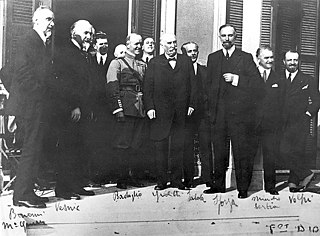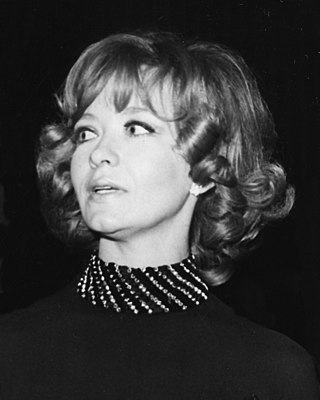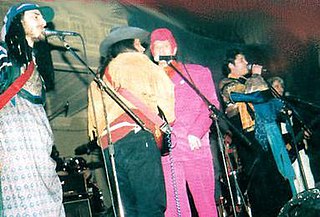This article relies largely or entirely on a single source .(March 2023) |
| | ||||||||||||||||
| ||||||||||||||||
All 41 seats in the Diet of Dalmatia | ||||||||||||||||
This lists parties that won seats. See the complete results below. | ||||||||||||||||
Parliamentary elections were held in the Kingdom of Dalmatia in 1895.
This article relies largely or entirely on a single source .(March 2023) |
| | ||||||||||||||||
| ||||||||||||||||
All 41 seats in the Diet of Dalmatia | ||||||||||||||||
This lists parties that won seats. See the complete results below. | ||||||||||||||||
Parliamentary elections were held in the Kingdom of Dalmatia in 1895.
| Party | Seats | +/– | |
|---|---|---|---|
| People's Party | 23 | –3 | |
| Serb People's Party | 9 | 0 | |
| Autonomist Party | 6 | 0 | |
| Party of Rights | 3 | New | |
| Total | 41 | 0 | |
| Source: [1] | |||

The Treaty of Rapallo was an agreement between the Kingdom of Italy and the Kingdom of Serbs, Croats and Slovenes in the aftermath of the First World War. It was intended to settle the Adriatic question, which referred to Italian claims over territories promised to the country in return for its entry into the war against Austria-Hungary, claims that were made on the basis of the 1915 Treaty of London. The wartime pact promised Italy large areas of the eastern Adriatic. The treaty, signed on 12 November 1920 in Rapallo, Italy, generally redeemed the promises of territorial gains in the former Austrian Littoral by awarding Italy territories generally corresponding to the peninsula of Istria and the former Princely County of Gorizia and Gradisca, with the addition of the Snežnik Plateau, in addition to what was promised by the London treaty. The articles regarding Dalmatia were largely ignored. Instead, in Dalmatia, Italy received the city of Zadar and several islands. Other provisions of the treaty contained safeguards for the rights of Italian nationals remaining in the Kingdom of Serbs, Croats and Slovenes, and provisions for commissions to demarcate the new border, and facilitate economic and educational cooperation. The treaty also established the Free State of Fiume, the city-state consisting of the former Austro-Hungarian Corpus separatum that consisted of Rijeka and a strip of coast giving the new state a land border with Italy at Istria.

Milena Dravić was a Yugoslav and Serbian film, television and theatre actress.

Bogdan Diklić is a Serbian actor. He has been active since the late 1970s and starred in over one hundred Yugoslav films and television series. Diklić made ten films with director Goran Marković. In August 2009, he received the Lifetime Achievement Award "Pavle Vujisić" for his body of work in Yugoslav cinematography.

Otvorena vrata, is a Serbian comedy television series filmed in 1994-1995. Broadcast on state television RTS, it ran for 2 seasons featuring a regular family living in Belgrade during the 1990s.
Parliamentary election were held in the Kingdom of Dalmatia on 26, 28 and 31 October 1908. They were the tenth and last to elect representatives to the Dalmatian parliament in Zadar, as World War I broke out before the end of the parliamentary term in 1915. The parliament was eventually abandoned and no new government was elected before Dalmatia became a part of the State of Slovenes, Croats and Serbs, and later the Kingdom of Serbs, Croats and Slovenes.
Parliamentary elections were held in the Kingdom of Dalmatia in 1883. The elections marked the first time that a party other than People's Party or Autonomist Party won seats in the Diet of Dalmatia.

RK Partizan is a Serbian handball club based in Belgrade. They compete in the Serbian Handball Super League and SEHA League.
The Meeting Point is a 1989 Yugoslavian fantasy/comedy-drama film directed by Goran Marković and starring Rade Marković, Bogdan Diklić, Dragan Nikolić, Mirjana Karanović and Anica Dobra. It is based on Dušan Kovačević's play of the same title translated in the U.S. as The Gathering Place.
Absolute 100 is a 2001 Serbian film written and directed by Srdan Golubović. It stars Vuk Kostić, Srđan Todorović and Bogdan Diklić.
King's Endgame is a 1987 Croatian film directed by Živorad Tomić.

Fuse is a Bosnian comedy/drama film directed by Pjer Žalica. It was released in 2003.

The Kuguars were a successful short-lived Serbian comedy rock band from Belgrade, mainly consisting of famous Serbian actors. Formed in 1997, the band released two albums featuring humorous songs, before disbanding in 2001.

Dragoljub Đuričić was a Serbia-based Montenegrin drummer.

Odjila is a Serbian and former Yugoslav music band. It was founded in 1983. What they play is generally referred to as Gypsy music, which is the traditional music of the Romani people of Eastern Europe. The word Odjila is a compound of two words in the Romani language: Odji (oђи) meaning "soul" and djila (ђила) meaning "song"

Jasna Diklić is a Bosnian theatre and film actress. She was born in Sarajevo. Her mother was also an actress and a puppeteer. Diklić's first theatre experiences began at MESS Festival's experimental theatre studio, after which she proceeded to study acting at the Department of Performing Arts in Sarajevo.
Arsen Diklić was a poet, novelist and film director of Serbian descent.

Čingrija is a Serbo-Croatian surname. Pero Čingrija (1837–1921) was one of four representatives of the People's Party that the Kingdom of Dalmatia elected in the 1911 Imperial Austrian elections. Melko Čingrija was the acting governor of the Yugoslav national bank between April 1934 and February 1935.
The Farm in the Small Marsh is a 1976 Yugoslav teen drama film directed based on a novel by Arsen Diklić. There is also a television series and the film Wintering in Jakobsfeld extending the story.

Legislative elections to elect the members of the 10th Imperial Council were held in Cisleithania, the northern and western ("Austrian") crown lands of Austria-Hungary, from December 12, 1900 to January 18, 1901.

Kriza (transl. Crisis) is a Bosnian television sitcom created and written by Feđa Isović and directed by Elmir Jukić.